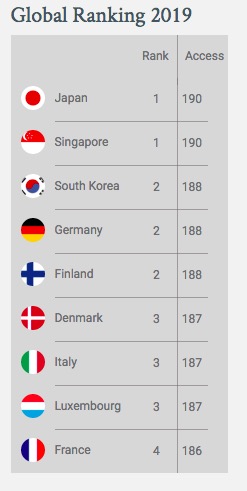1 Oct 2019
Singapore, Japan retain top spots in Henley’s Global “Passport Power” Index
LONDON, Oct. 1, 2019 /PRNewswire/ — As the global economy transforms and centers of power shift, Asia’s dominance appears to be unfaltering. Entering into the final quarter of 2019, Japan and Singapore retain a firm hold on first place on the Henley Passport Index, each with a visa-free/visa-on-arrival score of 190 out of a maximum 227.
For most of the index’s 14-year history – which is based on exclusive data from the International Air Transport Association (IATA) – the top spot has been held by a European country or by the US. However, this shifted dramatically in 2018, with Asian countries now firmly established as world leaders when it comes to both global economic activity and global mobility.

With visa-free/visa-on-arrival scores of 188, Finland, Germany, and South Korea remain in 2nd place, while Denmark, Italy, and Luxembourg are in 3rd place, with a score of 187. The UK and the US remain in joint 6th place with access to 184 destinations visa-free – the lowest position they have held since 2010 and a significant drop from their 1st-place ranking in 2014. Afghanistan sits at the bottom of the ranking, with access to just 25 countries without a prior visa.
Using historic data from the Henley Passport Index and the Index of Economic Freedom, political science researchers Uğur Altundal and Ömer Zarpli of Syracuse University and the University of Pittsburgh, respectively, found that “countries that have higher visa scores also rank higher in economic freedom, especially in investment, financial, and business freedom.”
Dr. Christian H. Kaelin, Chairman of Henley & Partners, says: “Our ongoing research has shown that ‘passport power’ is more than simply the destinations a holder can travel to without a visa. Often, there is a strong correlation between visa freedom and other benefits such as business and investment freedom, independence of the judiciary, fiscal health, and property rights.”
While Brexit is – in theory, at least – only weeks away, the focus is firmly on how it will affect migration policy to and from the UK. As Madeleine Sumption from The Migration Observatory at Oxford University notes, “Unlike trade policy, the future of immigration policy in the UK does not depend fundamentally on whether or not the UK leaves the EU with a deal.
In either scenario, there will be a ‘transitional period’ until at least December 2020, in which free movement of EU citizens to the UK will continue more or less as it operates today. After that however, long-term settlement is likely to be much more difficult for EU citizens. And UK citizens who want to move to EU countries after Brexit will also face more restrictive immigration regimes.”
The biggest climber on the index over the past quarter has been the UAE, up five places to rank 15th. Lorraine Charles at Cambridge University’s Centre for Business Research says: “While the UAE may not be able to compete with Saudi Arabia – the regional hegemon – in terms of military strength and economic power, the projection of its soft power is uncontested in the GCC.”
As they have done throughout the index’s long history, countries offering investment migration programs continue to perform strongly. Moving up from the 16th-place position it held last quarter, Cyprus now holds 14th place, with Cypriot citizens able to access 173 destinations visa-free. Malta retains its strong 7th-place position with a visa-free/visa-on-arrival score of 183, while Antigua and Barbuda has risen to 28th place with a score of 149 after gaining access to Russia.
